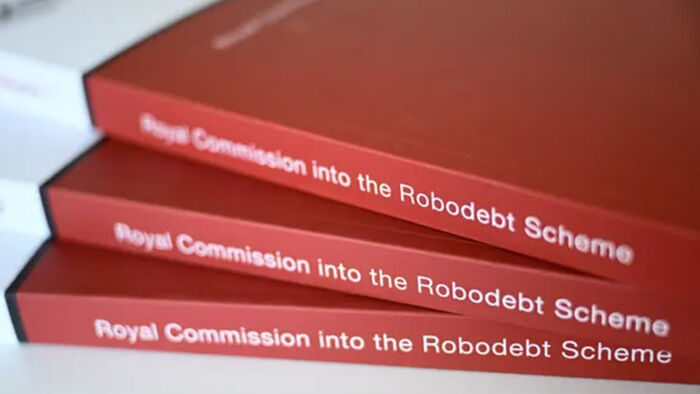What you need to know about the Robodebt report
By Nicola Field
Ten months in the making, 1000 pages long, and 57 recommendations: the Robodebt report is out, and the numbers are staggering.
The Royal Commission's recent report into the failed Robodebt scheme is packed with figures.
The most shameful is the 400,000-plus debts raised under the Robodebt scheme. Thankfully, most of these have now been scrapped or repaid.
This won't compensate victims for the stress their own government piled on them - people who in many cases were getting by on income support payments that put them below the poverty line.
The failure of machines
The Robodebt scheme relied on decision-making algorithms to identify overpayments of Centrelink income support.
The use of algorithms was not new.
Where Robodebt was different is that it lacked human oversight. The scheme relied solely on data-matching that compared welfare recipients' Centrelink records with Australian Taxation Office (ATO) details.
Researchers at the University of Queensland found the algorithm failed to handle basic issues such as recipients' unique work history including casual work, or even different spellings of employer names across Centrelink and ATO databases.
The upshot is that in a nation that champions the 'Aussie battler', Robodebt did the opposite.
It hounded welfare recipients, raising $1.7 billion in debts against 443,000 people least able to repay a debt (if one existed at all), and without the financial resources to fight it.
Have Robodebts been repaid?
Along with refunds or waivers of debt, in late 2022 Services Australia handed over compensation payments to around 400,000 members of the Robodebt class action.
These payments were pitifully low.
More than half the recipients (54%) received less than $300. One in four were awarded less than $50.
Gordon Legal, the law firm that led the Robodebt class action, is reportedly considering fresh compensation claims.
The losers - and winners
Catherine Holmes, who captained the Robodebt royal commission, says the scheme failed the public interest in "a myriad of ways".
Financially, it has been a disaster.
Designed as part of a package of measures meant to save the government $1.5 billion over five years, the scheme has generated a litany of costs including $971 million among government agencies, $1.2 billion in debt settlement, $112 million in compensation, and $30 million to hold a royal commission.
It's still unknown if the value of genuine welfare overpayments that were recovered came even close to the cost of clawing the funds back.
But there have been winners.
Three debt collection firms - Illion Australia (formerly Dun and Bradstreet), Probe Operations and Australian Receivables Limited, tasked with recovering debts of $20 or more, were paid $11.6 million for their services.
While the Robodebt reports notes that none of these firms acted unlawfully, there have been calls for the money to be handed back.
The Albanese government recently announced it would cease using external debt collectors.
The big red flag
The Robodebt debacle sends several cautionary warnings.
First, is the potential for many more Australians to have been impacted.
As Rowan McRae, executive director of Victoria Legal Aid points out, every second household in Australia accesses government payments - often in times of crisis.
In addition, the whole affair is a salient reminder of the dark side of artificial intelligence, and the dangers of relying on machine-made decisions.
Noel Cressie, Distinguished Professor of Statistics at University of Wollongong points to a mathematical law, which shows the Robodebt algorithm should have generated not only debts, but also credits.
He adds that if humans had checked real cases, the "stop" button would have been hit almost immediately.
It's worth noting that a small number of Robodebt settlement payments have been returned to Services Australia by banks.
If you haven't received a payment you're entitled to, call Services Australia on 1800 171 846 to update your bank details.
Get stories like this in our newsletters.



